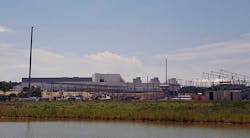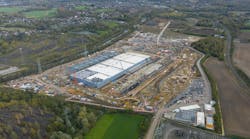MONTE CARLO, Monaco – Perhaps no one has had a better vantage point on the growth of hyperscale computing than Hossein Fateh, who has built many of the data centers housing servers for the world’s largest technology companies.
Fateh says the super-sizing of data centers and cloud campuses has a long way to go. At Datacloud Europe 2018, he discussed the history of data center growth, and made some startling projections for future growth.
“The largest deal of 2001 was 3.5 megawatts,” Fateh said. “That same company leased 35 megawatts from us in 2016. The decimal place moved by a column. The next decimal place will move in 2022. Deals will be 350 megawatts.
“The size of the deals are growing,” he continued. “They are no longer 20 or 30 megawatts, they are now 50 or 70 megawatts. That’s where we’re going – massive, massive deals.”
Fateh is the founder and principal of CloudHQ, a wholesale data center provider that focuses on the hyperscale computing ecosystem. He has been building mission-critical facilities since 1997, and is best known for his leadership of DuPont Fabros Technology (DFT), whose data centers powered the growth for the digital operations of Facebook, Microsoft, Apple and Google.
Building Bigger For the Long-Term
Cloud computing is a large business that is growing insanely fast. The leading cloud providers invested $27 billion in capital expenditures (CapEx) in the first quarter of 2018 the fourth quarter of 2017, most of which went for data center infrastructure to support cloud growth.
For many industry observers, the notion of a 350 megawatt lease of data center capacity might seem extraordinary. But Fateh is not alone in this view. Other developers at Datacloud Europe said they are also fielding inquiries for larger projects, including one data center REIT that says clients are seeking pricing on deals for 100-megawatt campuses.
The discussion of larger deals reflects two trends – the rapid growth of cloud computing, and the evolving needs of the huge players that dominate the cloud wars. This could mean larger data center buildings, but the more likely focus is on deals that span large multi-building campuses, which could be completed over time.
The growing requirements indicate that hyperscale players are intensifying their focus on long-term capacity planning, and embracing multiple strategies to deploy server capacity quickly and at the lowest cost possible. These include:
- Lean construction strategies that allow companies to use pre-fabricated components and off-site construction to accelerate delivery time.
- Data center supply chain strategies to provision and store equipment with longer lead times.
- Land banking, in which providers secure large parcels of land to support expansion over a period of years.
- New lease structures that make it easier for cloud builders to secure larger chunks of expansion space in strategic markets, while deploying capital on a pay-as-you-go-basis.
- Larger data halls, buildings and campuses, providing more capacity for users and better economics for developers.
Fateh has long been a proponent of building large facilities to capture economies of scale. Larger buildings allow developers to reduce their per-megawatt construction cost, according to Fateh, who outlined the advantages of scale in our 2013 interview. He says scale also creates better economics for operating and maintaining these hyperscale data centers.
Driving Toward Economic Efficiency
Other panelists at Datacloud Europe affirmed that view, saying the explosive growth of cloud computing is creating long-term demand for data center capacity. This has attracted new investors to the sector, and has hyperscale users focused on adding space quickly and affordably.
“It’s actually a very virtuous cycle,” said Jonathan Schildkraut, Chief Strategy Officer at CyrusOne, which has emerged as a major player in the hyperscale leasing market. “The capital investment in this space will accelerate, and you’re reducing costs to the end user.”
“There’s a lot of capital,” said Jeff Ferry, a Director at Goldman Sachs who specializes in data center investment. “Everything is driving towards a more efficient, lower-cost infrastructure.”
The new super-sized projects will likely target the most active data center markets, according to Madonna Park, a Managing Director at RBC Capital Markets.
“That 350 megawatts is not going to happen in Charlotte,” said Park. “Those projects are going to land in big markets, like Ashburn and London and Frankfurt.”
Ashburn: Land of the Giants
Ashburn, Virginia is one of the places where these visions of super-sized data centers are made real. Northern Virginia has become Cloud Central, and the appetite for capacity has prompted a land grab in which data center developers are buying up properties, often at premium prices. Market analysts predict the record-setting building boom in the region will accelerate in 2018, region is poised for its biggest year yet.
Hossein Fateh, founder of CloudHQ, speaks at the recent Datacloud Europe 2018 conference in Monaco. (Photo: Rich Miller)
For market watchers in Ashburn, Fateh’s comment about wholesale leasing deals reaching 50 to 70 megawatts is not taken as a hypothetical statement so much as an acknowledgement of the requirements already hitting the market.
As a private company, CloudHQ doesn’t disclose its leases or tenants. But its confidence in the Northern Virginia market can be clearly seen in the bulldozers moving dirt on a huge stretch of land along Loudoun County Parkway in the heart of Ashburn’s “Data Center Alley.” The company says only that it has site approval for a future campus in Ashburn, and is in discussion with potential tenants.
CloudHQ describes its approach to Ashburn as a design-build project in which specifications can be developed along with a customer. That’s the model the company followed on its first development, a 43-megawatt data center in Manassas, with 35 megawatts leased to a single anchor tenant. The company has been stealthy in its approach, but boasts an experienced team and relationships with marquee tenants.
In Ashburn, CloudHQ has plenty of company. Digital Realty is building a massive campus just across Loudoun County Parkway. Other providers in building mode include Vantage Data Centers, RagingWire Data Centers, QTS Data Centers, Amazon Web Services, CoreSite, CyrusOne and Infomart.
As data center deals get larger, these campuses are where they will arrive first. Fateh sees plenty of demand in the pipeline.
“I just think it’s the beginning,” he said at Datacloud Europe. “It’s early. The industry is evolving as new technologies are built. Innovation is not stopping. All the new industries being built on these cloud platforms are going to live in these cloud data centers.”
About the Author



